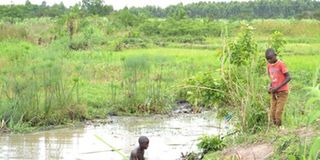Why degradation continues in Nakaseke, Luweero wetlands

Children play at a section of the Lubenge wetland in Nakasongola District. Locals accuse government of playing double standards and allocating wetlands to private investors. PHOTO | FILE
What you need to know:
- While concerned leaders claim to be sensitising the locals on wetland use, a section of the encroachers say the government approach is selective and targets people who have no ‘connections’ in government.
The degradation of wetlands in Nakaseke and Luweero district have continued despite a presidential directive to protect them.
The wetlands are water catchment areas for rivers Mayanja, Danze, Lumansi, and the Lugogo drainages.
While concerned leaders claim to be sensitising the locals on wetland use, a section of the encroachers say the government approach is selective and targets people who have no ‘connections’ in government.
Mr James Semyalo, a bricklayer at Kyerezi Wetland near River Danze, says the government continues to give away particular wetlands to foreign investors but is quick to chase away local bricklayers and farmers.
“The government has denied us a chance to exploit our own economic potential by favouring the foreigners. Through the brick laying business, my family has survived for the last 10 years,” he says.
Mr Serestino Ssembatya, a sugarcane grower at Lukumbi Wetland and a resident of Kiloro Village in Makulubita Sub-county in Luweero, says sugarcane growing does not destroy the wetlands as alleged by environmentalists.
“You are talking about the River Danze water irrigation scheme that I have never heard about. The government officials should instead help in sensitising the residents on the best ways of utilising the wetlands,” he says.
Mr Charles Kalema Ssalongo, a resident of Semuto Sub-county in Nakaseke, says: “Some of the wetland areas are properties of individuals who possess land titles. We do not know how they got them. What puzzles me like many other farmers is the fact that factories owned by foreign investors are allocated space in wetland areas. We need a better explanation from our leaders including the President.’’
But Mr Ignatius Kiwanuka Koomu, the chairperson of Nakaseke, says the conservation of wetlands and forests call for a cohesive approach in management.
“Wetland encroachment is almost in every part of the country and takes place under the watch of the government officials, including technocrats from different government offices. We need a combined effort that is not selective in approach. The political high office must act first. It is embarrassing to see investors clearing wetlands,” he said.
Mr Tonny Achidria, the senior public relations officer at the National Environment Management Authority (Nema), says all efforts are being made to safeguard different wetlands.
“On September 2, Nema stopped reviewing all applications for wetland areas. As of now, we have no approvals. The next step will be cancellation of certificates for those that contravene the set guidelines and issuance of improvement certificates. It is true the wetlands are grossly encroached on, but we are undertaking the measures to protect the resource countrywide,” he said.
Mr Achidra says Nema does not act independently, but works with the district local governments.
“Some of the activities have been decentralised with the powers to monitor and regulate the wetland activities left to the environment officers at the district level,’’ he says.
Ms Scovia Kayonga, the Luweero District environment officer, says engagement meetings and sensitisation that target encroachers to vacate wetland areas in Makulubita have been undertaken.
“We have continued with dialogue and issuance of notices to defying individuals,” she said.
But Mr Erasto Kibirango, the chairperson of Luweero, in an interview with the Daily Monitor, says the political will to fight environment degradation is lacking.
“Look at the different wetland areas on the Kampala-Gulu highway where different investment companies have been cleared for factory construction. It is clear these investors get permission to use the wetlands. To save the environment, we need to have a common will,” he said.





